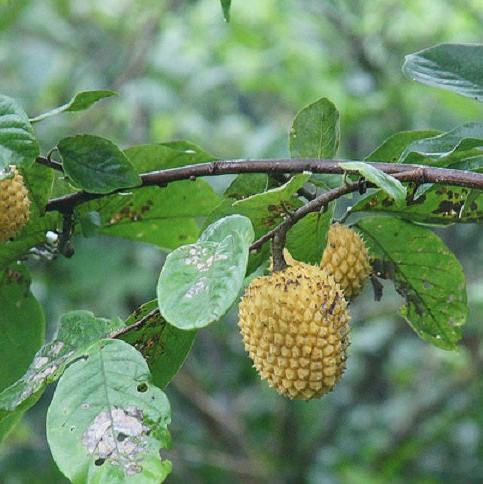Love it? Add to your wishlist
Your favorites, all in one place. Shop quickly and easily with the wishlist feature!
[message]
[title]
[message]


Veliyath Gardens
Couldn't load pickup availability
Annona Jahnii is an exotic tropical fruit plant from the Annonaceae family, revered for its nutritional richness, medicinal properties, and unique appearance. Native to the lush forests of Brazil, Colombia, and Venezuela, this fruit plant reaches a height of 4 to 6 meters, making it a moderately-sized tree suitable for gardens and exotic landscapes. Named after the Venezuelan scientist Alfredo Jahn by botanist William Edwin Safford, this plant holds cultural, health, and environmental significance, gaining popularity among fruit lovers and plant enthusiasts.
The fruits of Annona Jahnii are a visual delight with their pyramid-shaped bumps arranged in a spiral pattern, covered in dense rust-colored hairs that add a tactile appeal. Inside, the fruit reveals its edible pulp, which is soft, sweet, and pleasantly flavored, offering a juicy texture with a tropical burst. The flesh is comparable to other Annona species like cherimoya or sugar apple, with a creamy mouthfeel and a mix of subtle sweetness.
The taste of Annona Jahnii can be described as a deliciously sweet and mildly aromatic experience, with a flavor profile that falls between tropical sweetness and refreshing tartness. The fruit’s pulp is tender, juicy, and ideal for eating fresh. Its mildly fragrant nature and delightful flavor make it a perfect addition to fruit salads, smoothies, or simply eaten on its own. The sweet flesh is particularly appealing to those who enjoy the subtle sweetness of other fruits like custard apples or cherimoya.
Annona Jahnii is not just a feast for the taste buds; it is also a nutritional powerhouse, offering several health benefits:
Rich in Vitamin C: With approximately 19.2mg of Vitamin C (ascorbic acid), this fruit is excellent for boosting the immune system, helping protect against illnesses and infections, and promoting skin health by aiding in collagen production.
B Vitamins: Annona Jahnii contains B-vitamins like B6 and Thiamin, which are essential for energy production and maintaining brain health. These vitamins help in maintaining a healthy metabolism, reducing fatigue, and supporting cognitive function.
Digestive Health: The fiber-rich nature of the fruit contributes to healthy digestion, regulating bowel movements, and reducing the risk of digestive disorders.
Antioxidants: Annona Jahnii is packed with antioxidants, which help neutralize free radicals in the body, promoting overall cellular health and reducing the risk of chronic diseases like heart disease and cancer.
As a tropical species native to the rainforests of Brazil, Colombia, and Venezuela, Annona Jahnii plays a vital role in supporting biodiversity. The tree attracts pollinators such as bees and insects, contributing to the overall health of tropical ecosystems. In regions where it grows naturally, it is also an important source of food for local wildlife. By introducing this tree into cultivation in gardens, it helps promote the preservation of species and supports ecological balance.
In its native regions, Annona Jahnii has a rich cultural heritage, often used in traditional remedies similar to its related species. The leaves, fruits, and seeds of the Annona family have been traditionally used in treating various ailments. For instance, the leaves of related species like Annona muricata (soursop) are known for their use in treating headaches, insomnia, and digestive disorders. The fruit has been part of traditional diets and folk medicine due to its nourishing and health-enhancing properties.
Although specific details about Annona Jahnii's traditional uses are less documented, it is reasonable to believe that this species, like other Annonaceae plants, has been valued for its nutritional and medicinal properties in local cultures. The tree's beauty also makes it a desirable addition to landscapes, symbolizing fertility and abundance in some traditions.
Annona Jahnii thrives in tropical and subtropical climates, where it can be planted in exotic fruit gardens or tropical landscapes. It takes approximately 3 to 4 years for the tree to bear fruit. Though it requires moderate maintenance, it is a relatively hardy plant once established, capable of tolerating varying conditions as long as it is provided with sufficient water and sunlight.
It is suitable for fruit plant gardens and can be planted alongside other tropical trees to create a thriving exotic garden. The dense foliage and unique fruits make it an attractive choice for plant lovers who want to enhance the biodiversity of their gardens.
Due to the rarity and high demand for Annona Jahnii, it may sometimes experience occasional shortages at Veliyath Gardens. However, efforts are continuously made to ensure its availability for enthusiastic fruit lovers and gardeners who wish to grow this extraordinary tropical fruit tree. If you’re looking to add this unique fruit tree to your exotic fruit plant nursery, it’s advised to visit or contact Veliyath Gardens early to secure your plant.
At Veliyath Gardens, we take pride in offering rare and exotic plants like Annona Jahnii to enhance your garden’s beauty and provide you with delicious, nutritious fruits. This unique tropical fruit tree is perfect for both enthusiasts and those new to tropical gardening. Don't miss the opportunity to introduce this extraordinary fruit into your garden or your diet. Visit us today to explore the world of exotic fruit trees, and let us help you grow something remarkable!
It takes approximately 3 to 4 years for the tree to bear fruit. Though it requires moderate maintenance, it is a relatively hardy plant once established, capable of tolerating varying conditions as long as it is provided with sufficient water and sunlight.
B Vitamins: Annona Jahnii contains B-vitamins like B6 and Thiamin, which are essential for energy production and maintaining brain health. These vitamins help in maintaining a healthy metabolism, reducing fatigue, and supporting cognitive function.
Digestive Health: The fiber-rich nature of the fruit contributes to healthy digestion, regulating bowel movements, and reducing the risk of digestive disorders.
The fruit’s pulp is tender, juicy, and ideal for eating fresh. Its mildly fragrant nature and delightful flavor make it a perfect addition to fruit salads, smoothies, or simply eaten on its own. The sweet flesh is particularly appealing to those who enjoy the subtle sweetness of other fruits like custard apples or cherimoya.



